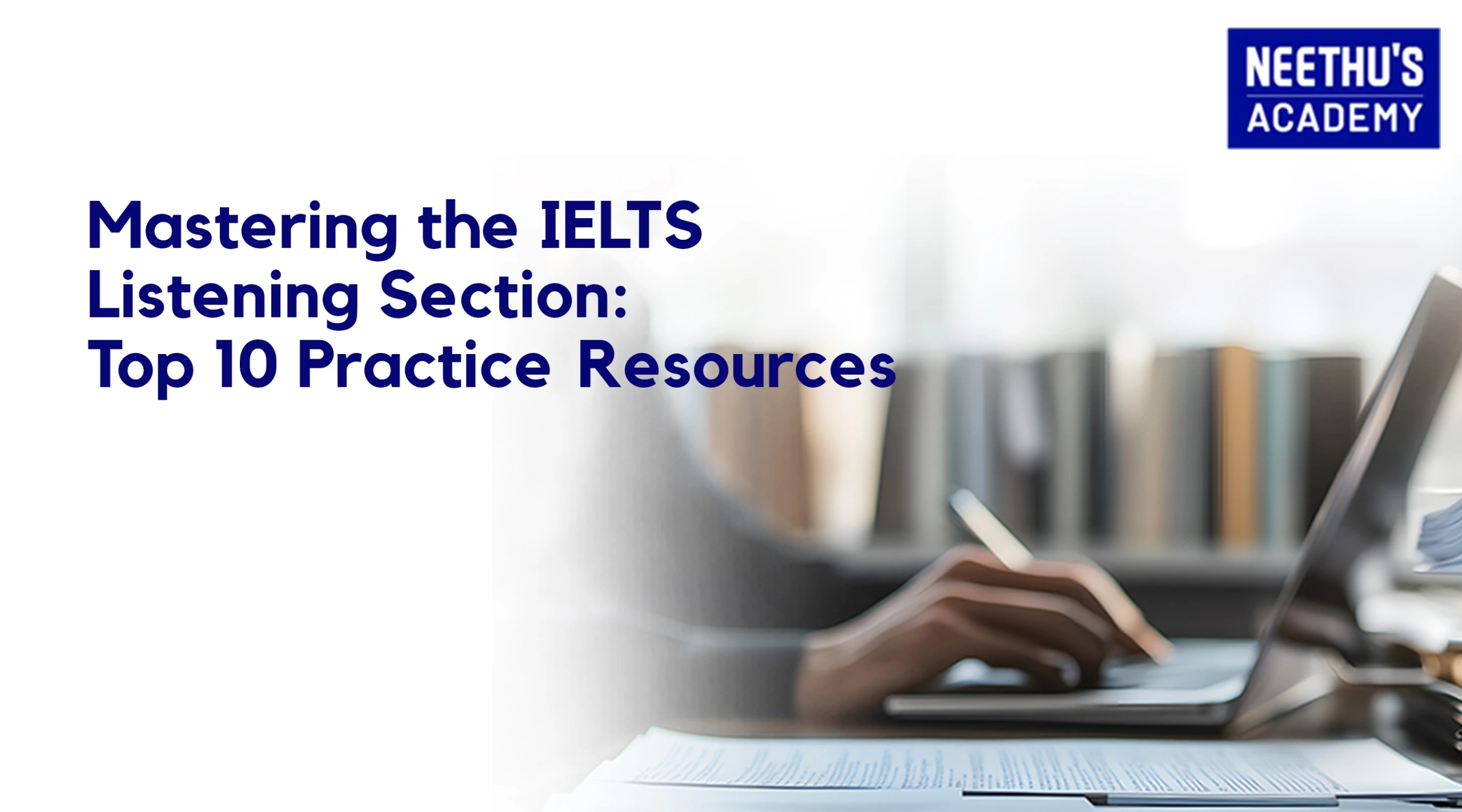IELTS Listening Tips: Boost Your Band Score Quickly with Proven Strategies
Scoring high in IELTS Listening will greatly help you study, work, or migrate to English-speaking countries, but to many candidates, listening is more challenging. With different kinds of accents and conversations that come at a very fast pace, not to mention topics are tough to understand. However, with proper practice and strategies, improvements in listening skills can be achieved. The Listening section in the IELTS test checks and assesses the candidate’s ability to understand spoken English in various settings, like conversations, lectures, instructions, etc. A greater amount of listening practice isn’t just about hearing words; it would also require focused listening, effective note-taking, quick comprehension, and attention to detail. Proper practice and strategy, along with proper guidance, do not make scoring high in the IELTS Listening test impossible.
In this blog, we will guide you through tested and trusted IELTS listening tips and tricks that are sure to hone your focus and catapult your performance upwards. This blog is perfect for first-time test takers and those looking to advance their scores since it offers practical insight into effective preparation. It helps you perfect the art of note-taking, how to manage time and loads more in helping you attain the listening score you want.
Ready to get started on the journey toward a better score? Let’s go!
Understand the IELTS Listening Format
Before starting the preparation, you should understand the IELTS Listening test format. It consists of four parts which gradually get more difficult. You will listen to recordings of various types: conversations, monologues, and academic discussions, and answer 40 questions about what you heard during the recording. In all four parts, you will be exposed to different accents of native speakers of English.
Section 1: A conversation on everyday topics, such as booking a hotel room.
Section 2: A monologue on a social context, such as a tourist guide talking about the city.
Section 3: A conversation among two or four participants during the educational process, e.g., a student group discussing a project.
Section 4: Monologue on an academic subject, as one might listen to a lecture.
This test lasts about 30 minutes, after which you are provided with an additional 10 minutes to transfer the answers onto the correct answer sheet. This paper is graded out of 40, and your band score is calculated on how many you got right.
Tip 1: Practice Active Listening
Active listening refers to the process in which one not only hears but is also totally absorbed and attentive to the audio, focusing on keywords and inferring meaning. In the case of IELTS Listening test, it is sometimes necessary to listen for certain information that will enable the delivery of the answer accordingly.
How to Practice Active Listening
Listen attentively: Pay attention to the information, tone, and context the speaker is trying to convey. Pay attention to transitions, pauses, and changing subjects.
Engage with the material: Take notes while listening and practice summarising in your own words during your practice session.
Challenge yourself: As your listening skills improve, challenge yourself by trying tougher material. You can begin with everyday conversations and move on to academic lectures or podcasts.
Resources for Active Listening
BBC Radio: This site offers great podcasts on a variety of topics and will introduce you to various accents and speech rhythms.
TED Talks: These are great for listening to argumentative debates.
IELTS Online Practice: Online IELTS listening practice is also available. The official IELTS website also provides practice tests that are just as real as the actual test conditions.
While inculcating active listening into your daily life, you will find it more efficient to grab the key information within the IELTS Listening test and anticipate some answers.
Tip 2: Develop Note-Taking Skills
Good note-taking will make you remember essentials and answer questions more effectively. You’ll only listen to the audio once, so concision and clarity must be retained.
Quick Note-Taking Techniques:
Use abbreviations and symbols: You can make abbreviations so that you can write things down faster. For instance, “w/” means “with” or “env” means “environment.”
Logically organize information: Take your notes and organize them segmentally. Do so in segments that coincide with the sequence of questions. This will enable you to find the answers easily.
Writing Important Information Only: We can write only important things such as names, dates, numbers, and locations. Write only keywords or phrases and avoid full sentences.
How to Practice Note-Taking
- Take mock tests from time to time and focus on improving your note-taking speed.
- Listen to podcasts or news broadcasts and attempt to summarize what you hear in a very short time.
Tip 3: Improve Your Vocabulary and Spelling
Vocabulary and spelling are very important for IELTS Listening. The more vocabulary you use, the better you will understand more difficult audio recordings. Good spelling will ensure you do not lose due to technical reasons.
How to Expand Your Vocabulary
Read extensively: The more one reads, the more words he or she encounters. Try reading articles, newspapers, and even fiction to expose yourself to different types of vocabulary.
Vocabulary notebook: Use a vocabulary notebook to keep an ongoing list of new words you encounter as you practice, along with their meanings and example sentences.
Practice listening to complex material: The greater the variety of material, the more your vocabulary becomes developed. Again, listen to academic or professional English to get in tune with the IELTS topics.
Spelling Tips
Familiarize yourself with British and American spelling: In IELTS, both the British and American spellings of a word are accepted, but you must use one form consistently.
Go through common spelling mistakes: The words like “environment” and “necessary” misspelled are more often; hence, write down tricky words and study those before your test.
With extensive reading, vocabulary expansion, and spelling practice, you’ll soon be able to understand and answer listening questions much more accurately.
Tip 4: Learn to Identify Key Information
In the IELTS Listening examination, you will frequently need to find specific details like dates, times, names, or locations. Your skill at picking up the information on the spur of the moment will greatly be an advantage for you.
How to Focus on Keywords
Analyze questions: You have time to read all the questions before hearing the audio. That gives you a chance to find keywords in the questions.
Anticipate answers: Based on the keywords, try to guess what information will come after in the audio. For example, if you are asked for a time or date, listen for that.
Practice Strategy
Mock tests: Practice how to identify the relevant key details by using mock tests in timed conditions. The better you know the structure, the quicker you will be in identifying the key information.
Tip 5: Master Time Management
The Listening test requires good time management, because when you listen to the audio, you only hear it once. It saves your time from moving on to other questions and creates panic at a time of being stuck.
Time Management Tips
Move on if unsure: If you are not sure about some part of the answer, you definitely do not want to spend too much time and effort over that. Move on to the next one and return later if possible.
Practice under timed conditions: Start the timer when you practice while listening to simulate test conditions. The more you practice, the better you’ll do at handling the pressure of being time-constrained.
Therefore, mastering the art of time management will enable you to answer all these questions in the right and effective way and also avoid getting caught up or pressing to answer all the questions given.
Tip 6: Familiarize Yourself with Accents
In the IELTS Listening, there is a variety of English-speaking country accents – British, Australian, and American. Acquaintance with the accents is required to score well on the test.
How to Get Familiar with the Accents
You should watch movies or films from different countries. This is one way of being exposed to different accents in a natural setting. For example, you could be watching some British shows like “Sherlock” or even Australian shows like “Neighbours.”.
Listen to international podcasts: This can help you get accustomed to different pronunciations and speech patterns.
The more you are exposed to different accents, the more comfortable you will be in understanding them during your IELTS Listening test.
Common Mistakes to Avoid in IELTS Listening
Not reading the questions carefully: You should read the questions and identify keywords before the audio starts.
Missing critical information: Instead of trying to comprehend every word, try to listen for the answers.
Panic after missing an answer: Do not panic over missing an answer. Move to the next question if you can.
Conclusion
Improving listening band scores under IELTS can be achieved quickly by practicing proper strategy, regular practice, and smart time management. You can listen more actively, improve your note-taking skills, build your vocabulary, and familiarize yourself with accents. Moreover, you have to practice under timed conditions to master the concept of time management. Thus, it is likely to achieve the desired band score through continuous effort and the right resources.
Frequently Asked Questions





